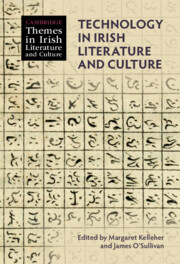Book contents
- Technology in Irish Literature and Culture
- Cambridge Themes in Irish Literature and Culture
- Technology in Irish Literature and Culture
- Copyright page
- Epigraph
- Contents
- Contributors
- Cambridge Themes in Irish Literature and Culture
- Acknowledgements
- Introduction
- Part I Genealogies
- Part II Infrastructures
- Part III Invention
- Chapter 8 Technology, Writing, and Place in Medieval Irish Literature
- Chapter 9 The Critique of Sola Scriptura in A Tale of a Tub and STEM in Gulliver’s Travels
- Chapter 10 Technology and Irish Modernism
- Chapter 11 W. B. Yeats, the Revival, and Scientific Invention
- Chapter 12 James Joyce, Irish Modernism, and Watch Technology
- Chapter 13 Technology, Terminology, and the Irish Language, Past and Present
- Part IV The Digital
- Index
- References
Chapter 10 - Technology and Irish Modernism
from Part III - Invention
Published online by Cambridge University Press: 19 January 2023
- Technology in Irish Literature and Culture
- Cambridge Themes in Irish Literature and Culture
- Technology in Irish Literature and Culture
- Copyright page
- Epigraph
- Contents
- Contributors
- Cambridge Themes in Irish Literature and Culture
- Acknowledgements
- Introduction
- Part I Genealogies
- Part II Infrastructures
- Part III Invention
- Chapter 8 Technology, Writing, and Place in Medieval Irish Literature
- Chapter 9 The Critique of Sola Scriptura in A Tale of a Tub and STEM in Gulliver’s Travels
- Chapter 10 Technology and Irish Modernism
- Chapter 11 W. B. Yeats, the Revival, and Scientific Invention
- Chapter 12 James Joyce, Irish Modernism, and Watch Technology
- Chapter 13 Technology, Terminology, and the Irish Language, Past and Present
- Part IV The Digital
- Index
- References
Summary
This chapter argues that Irish modernism is founded on a broad notion of technology as form and an awareness of the embeddedness of technoscience in the imperial military power that supports British colonial rule. The first wave of Irish modernists, or what are referred to in the chapter as protomodernists, engaged critically with technological forms by the end of the nineteenth century, setting them alongside literary forms and evaluating them as modes of perception, engagement, and mediation. By the height of the European modernist period, Irish modernists would fully acknowledge that technoscientific development was part of a larger network of forms that could not be so easily disentangled from literary form. And all recognised those forms, this chapter argues, as ‘[organising] a situation of moral decision-making’, in the words of Peter-Paul Verbeek.
- Type
- Chapter
- Information
- Technology in Irish Literature and Culture , pp. 168 - 185Publisher: Cambridge University PressPrint publication year: 2023

